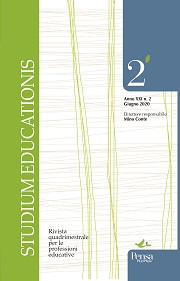Possibilities and limitations of intercultural competence assessment
DOI:
https://doi.org/10.7346/SE-022020-07Abstract
The assessment of intercultural competence is an issue of primary importance, especially nowadays in a society becoming more and more complex and multicultural. Far from being merely a question of methodological choice, it rather represents a theoretical, epistemological and, ultimately, an ethical challenge, given its impact on the subjects involved. What would it actually mean, thin-king about the practical, factual consequences, if a student wouldn’t give importance to human rights and cultural diversity? Or if he/she had the lowest level of respect for others? And what would the implications of a “negative” evaluation be in terms of consequential actions by teachers?Should they intervene by trying to change students’ values and attitudes? These are only some of the questions that outline a field which is currently debated. After analyzing some critical pro-blems including the limits of the models that currently exist in literature, the difficulty in the as-sessment of attitude and awareness in a reliable manner and the gaps in identifying the relationship between tout court intercultural competence and an interculturally competent perfor-mance, the author outlines some proposals to carry out the assessment in education.


